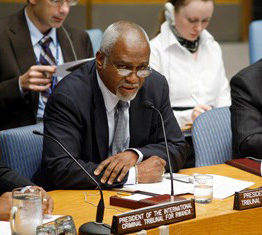| Press Release |
PRESIDENT
|
| (Exclusively for the use of the media. Not an official document) |
|
The Hague, 6 December 2010
NJ/MOW/1375e
President Robinson’s Address Before the Security Council
 |
| ICTY President Judge Patrick Robinson |
The Tribunal’s President, Judge Patrick Robinson, today addressed the United Nations Security Council on the work of the Tribunal. He highlighted the pressures placed on staff and resources at the Tribunal and called for action to reduce staff attrition. He also reiterated his call for the creation of a trust fund for victims of war crimes.
The President explained that the Tribunal “continues to take all measures possible to expedite its trials, without sacrificing due process.” However, he noted that the “Judges have reported feeling extreme pressure to expedite the work of the Tribunal” and that “Judges are entitled to work in an environment free from all external pressures, so that their independence is not compromised, or appear to be compromised.”
The President said that despite these measures to expedite trials, there were amendments to the estimates in the trial schedule due to influences outside the Tribunal’s control, such as “witness intimidation, the failure of witnesses to appear, the illness of accused, the death of defence counsel, the complexities associated with self-represented accused, the discovery of new evidence, and staff attrition.”
On the issue of debilitating staff attrition, the President thanked the Security Council for Resolution 1931, which noted the importance of the Tribunal being adequately staffed to complete its work expeditiously and called upon the Secretariat and other relevant United Nations bodies to continue to work with the Registrar to find practicable solutions to address this issue. The President, however, highlighted concern that this resolution had not been translated into action.
The President explained the confusion that has arisen over implementation of two recommendations made by the Staff Management Coordination Committee in June 2010. First, the recommendation that the Tribunal’s staff be given two-year fixed-term appointments, subject to another extension of two years, was not able to be implemented because the Tribunal does not have the approved budgetary funds. Second, the recommendation that Tribunal staff be given priority in consideration of eligibility for conversion to permanent contracts had been hindered by the Office of Human Resource Management’s referral of the Tribunal’s requests for conversion to a central review board, where they are likely to languish for some time.
The President reiterated his call to create a trust fund for victims of crimes within the Tribunal’s jurisdiction. He stated that “to build a lasting peace, justice must not only be retributive—it must also be restorative”. He said that the trust fund would “complement the Tribunal’s criminal trials by providing victims with the necessary resources to rebuild their lives.”
In making this proposal, the President said that: “the Tribunal is extremely sensitive to the financial difficulties being experienced by Member States. And it has not escaped our notice that, lately, the importance of the concept of justice has come under fire. But it is precisely in difficult times that we must be the most vigilant in safeguarding the role of justice in our society. We must not lose sight of the reason why the Security Council created the Tribunal in the first place.”
In closing, the President remarked that justice matters “because in a world without justice, right would be determined by might, and the weak would be at the mercy of the strong” and asked the Security Council—“the architects of that justice”—to stand by the Tribunal as it implemented the Council’s “vision of a world that is ruled not by might, but by right.”
Every six months, the President and Prosecutor submit to the Security Council their assessments on the progress made towards implementation of the completion strategy of the Tribunal in accordance with Resolution 1534. The reports set out the measures that have been taken and that remain to be taken in order to complete the work of the Tribunal.
The latest completion strategy report estimates that of the ten cases in the trial or pre-trial stage, four will be concluded next year, and five are anticipated to conclude in 2012. The case of Radovan Karadžić is expected to finish at the end of 2013. All appeals are scheduled to be completed by the end of 2014, although the recent, unavoidable delays in the Karadžić case suggest that this date will have to be re-assessed at an appropriate time.
Additionally, the President submits an Annual Report to the UN Security Council and General Assembly. The Annual Report, usually submitted in November, covers the 12-month period of 1 August to 31 July and includes an overview of activities of all sections of the Tribunal.
Since its inception 17 years ago, the Tribunal has indicted 161 persons for war crimes committed on the territory of the former Yugoslavia. The proceedings against 125 individuals have been completed. Only two indictees remain at large—Ratko Mladić and Goran Hadžić.
*****
The full text of the President's speech can be found at:
The latest Completion Strategy Report can be found at:
In English
In French
An archive of all Completion Strategy Reports from previous years can be found at:
http://www.icty.org/tabs/14/2
An archive of all speeches made by the Tribunal’s principals can be found at:
http://www.icty.org/sid/10259
*****
International Criminal Tribunal for the former Yugoslavia
For more information, please contact our Media Office in The Hague
Tel.: +31-70-512-8752; 512-5343; 512-5356 Fax: +31-70-512-5355 - Email: press [at] icty.org
Follow ICTY on Twitter and Youtube

